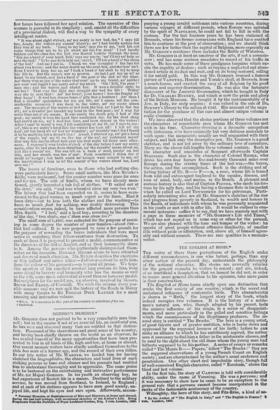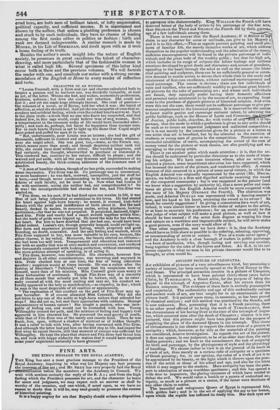THE ENGLISH AT HOME.*
THE writer of these three portraitures of the English under different circumstances, is one who better, perhaps, than any other author of the present day, understands the philosophy of the national character. His stories are avowedly vehicles for the general remarks he wishes to record ; and are, indeed, of so inartificial a desuiption, that we lament he did not, in order to insure more general attention to his opinions, take more pains in their construction.
The English at Home turns chiefly upon one distinction that marks the first society of our country, which is the secret and undeclared influence of aristocratic birth. This characteristic is shown in " Birth, " the longest story of the book, which indeed occupies two volumes. It is the history of a noble- man's natural son, who, though adopted by his parent, feels the sinister influence of his origin, in a series of disappoint- ments, and more particularly in the galled and sensitive feelings
which the consciousness of his illegitimacy produces. The se- cond story is entitled " The Brooks." The hero is a young artist, of great talents and of greater ambition, who is borne down and oppressed by the supposed lowness of his birth : before he can make an alliance to which he has ambitiously aspired, the author sees it necessary to find him a father in the aristocratic classes, and to send to the right-about the old dame whom the young man had hitherto supposed to be his Mother. A series of essays or remarks called " The Monte B— Papers," follow " The Brooks :" they are
the supposed observations of a young French Count on English society ; and are characterized by the author's usual acuteness and penetration. One other short and improbable story, though full of well-conceived English character, called " Earsham," closes the third and last volume.
In the first tale, the story of CANNING is told with considerable ability, under the name of Verening. He was a parvenu; and it was necessary to show how he came to be an exception to the general rule that a parvenu cannot become incorporated in the ranks of the fashionable aristocracy of the country. • Willoughby, the hero of this story, and.Fitz-Erne, a kind of se• • By the Author of "The English In Italy," and "The English In France.", 11 vole. Lcindon, IWO. • fond hero, are both men of brilliant talent, of lofty acciuirem*nt, political capacity, and sufficient income. It, is maintained and shown by the author; that unless a plodding profession is chosen and stuck to by such individuals, they have no chance of leading among the first ranks either in politics or fashion : birth and rank are deemed indispensable. A similar remark is made by IVIomix, in his Life of SHERIDAN, and dwelt upon with as it were a home feeling of its truth. Besides the author's acute insight into the nature of English Society, he possesses in great excellence the talent of character- drawing, and more particularly that of the fashionable woman in what is called high life. Several specimens of this latter kind occur both in these and the previous volumes. We will furnish the reader with one, and conclude our notice with a strong recom- mendation of the English at Home to every reader of reflection and taste.
CHARACTER OF AN HEIRESS.
"Louisa Creswell, with a form and eye and charms calculated both to inspire a passion and to harbour one, was decidedly incapable, at least as yet, of the latter. Whims she had, and wishes, momentary preferences, kindness, softness ; but love she could not entertain. She could not feel it ; and yet she made huge attempts thereat. She read of passion— the volumes of a novel, or of Byron, told her what it was : she heard of affection, as what she should feel. And yet she was incapable of even that se- condary and artificial feeling, which eventhe coldest hearts arrive at. Such is the plain truth—a truth that no one who knew her suspected, and that indeed few, in.this sage world, could believe true of any woman. Such a temperament in the common walks of life would have succeeded admi- rably ; and such do, perhaps, bid fairer for happiness than warmer ones. For in such hearts Hymen is apt to light up the flame that Cupid might have poked and puffed for ages at in vain.
" But, unfortunately, poor Louisa was an heiress; she had the gift of thousands, sufficient to content and elevate, in a worldly sense, whomso- ever she might select. She was good, too,—bonne, as the French say, which means more than good ; and though despising neither rank nor title, she could have done without either. She wanted happiness, and had certainly, she thought, wherewithal to purchase or command it. This rendered her, contrary to her nature, difficult to please ; and she waived and put aside, with all the easy firmness and impertinence of an established beauty, the thick-coming addresses of the common race of dandies.
"A man of humbler claims, though of no less pride, succeeded in making Some impression. Fitz-Erne was he. No personage was so uncommon, or more handsome; he was dark, reserved, susceptible, just the stuff for a hero,---and though never condescending to be sentimental, or giving tokens of such faculty, yet he must be so. Now what had Louisa to do with sentiment, seeing she neither had, nor comprehended it? So it was I the incomprehensible had charms for her, and Fitz-Erne was smiled on.
"Fitz-Erne, on his part, if he had fixed upon one maxim in life, it was that of not being interested or ambitious in his loves. He hid steeled his heart against'. high-born beauty: he meant, it seemed, high-bolri- beauty with the pride and indifference of birth about it. But the 'said
i
beauty, decked in smiles, in meaning smiles, acting kindness,-looking preference,—for that he was not prepared. It perplexed, flattered, fright- ened him. Pride and vanity had a smart wrestle together within him; but the heels of pride were tripped up. He loved the lady for her charms, her heart. For him to have doubted that she had one, would have been infidel indeed. Louisa's eye, though generally languid, could yet light up. Her form and expression promised feeling, which propriety and good breeding, no doubt, concealed. And the said feeling and warmth, which Fitz-Erne supposed in her, was more valuable in his eyes, because, like other charms, it lay veiled. Moreover, the beauty uttered no silliness— she had been too well bred. Temperament and education had endowed her with an apathy that was at once modish and convenient, and rendered her fortunately contented with looking perfection, without encountering the more arduous attempt of speaking, or of acting it.
" Fitz-Erne, however, was mistrustful. His character, however firm and decisive in all other considerations, was wavering and wayward in this. Pride checked him at one time, the fear of being ridiculous another; suspicion would at times intrude. He was a suitor after the fashion of Sheridan's " Falkland," except that his suspicions were of himself, more than of his mistress. Miss Creswell grew soon weary of these tortuosities of sentiment. Though Fitz-Erne was of a sincerity is all these moods that actually put him to torture, still, as he exter- nally covered all with the most smiling and easy air, his conduct na- turally appeared to the lady as mystification,—as coquetry, in fine ; which in man is the most despicable of all realities or appearances.
" The explication of this conduct on the part of Fitz-Erne may ap- pear hereafter. It of course alienated Miss Creswell. Why did she not listen to any one of the noble or high-born suitors that attended her steps ? She did not so, but met their approaches with coldness. Strange inconsistency of human nature I She sought a passion, who was inca- pable of feeling one, and would not be contented with less. Young Willoughby crossed her path, and the mixture of feeling and foppery that appeared in him charmed her. He possessed the mad gayety of youth, while that of Fitz-Erne was of the manly and caustic kind. Then he was frank, free, open, without a shadow of mistrust or of hidden thought. It was a relief to talk with him, after having conversed with Fitz-Erne. And although the latter had put him on the first step in life, had imped the first wing he raised therein, still that moment of success was sufficient for Willoughby. He kept the place that chance and Fitz-Erne had thrust him to, and took with happy audacity the station that it would have required some years' experience naturally to have attained."



























 Previous page
Previous page